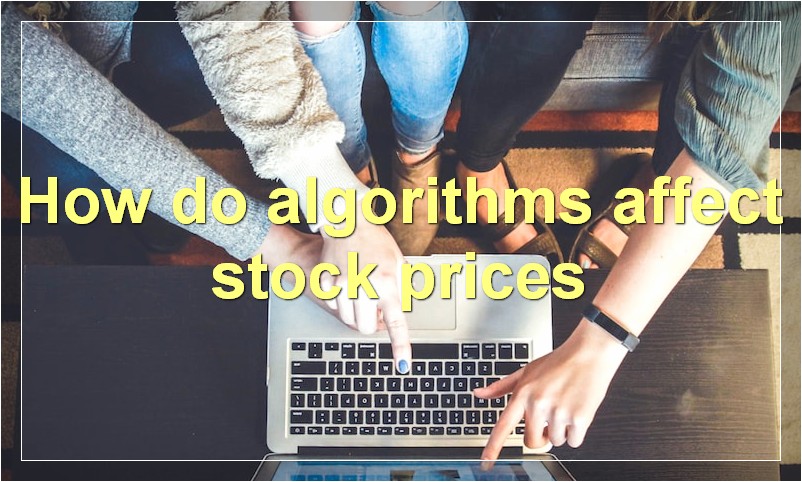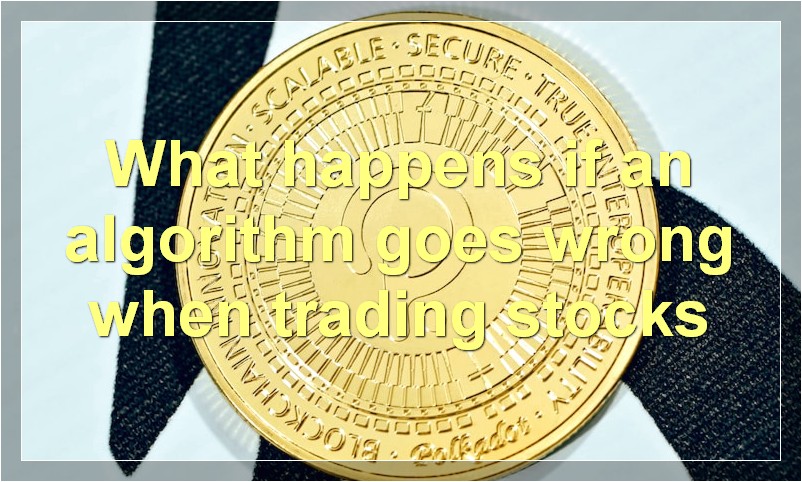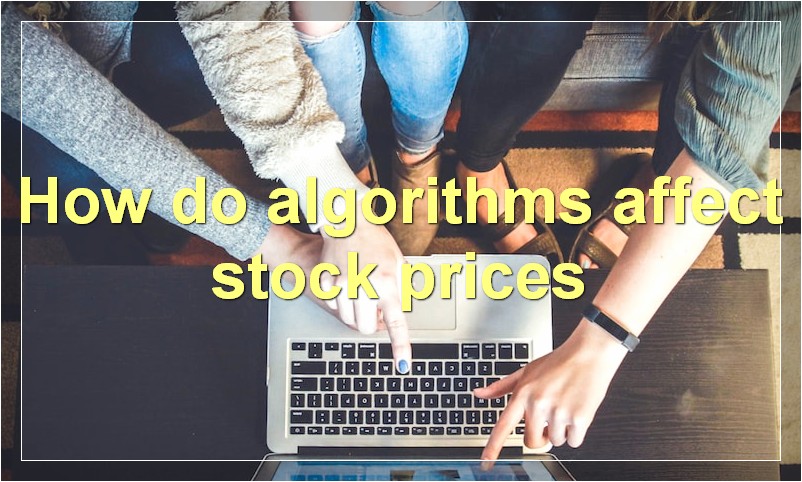If you’re looking to get started in stock trading, you need to know the ins and outs of algorithms. In this comprehensive guide, we’ll cover everything you need to know about algorithms and stock trading.
What are algorithms
Algorithms are a set of instructions that are followed in order to solve a problem. They are designed to be efficient and to use resources in a optimal way. Algorithms have applications in many different fields, including mathematics, computer science, engineering, and operations research.
How do algorithms affect stock prices

Algorithms are a set of rules or processes that are followed in order to solve a problem. In the case of stock prices, algorithms are used to make decisions about buying and selling stocks.
Algorithms can have a significant impact on stock prices. For example, if a large number of people are using an algorithm to buy a particular stock, the price of that stock is likely to go up. Similarly, if there is an algorithm that is designed to sell a stock when it reaches a certain price, then the price of that stock is likely to go down.
Algorithms can also be used to predict future stock prices. This can be done by analyzing past data and trends. If an algorithm predicts that a particular stock is going to go up in value, then people are likely to buy that stock, which will cause the price to increase.
Overall, algorithms can have a significant impact on stock prices. They can be used to buy or sell stocks, and they can also be used to predict future prices.
What are some common algorithms used in stock trading
There are many different algorithms that can be used in stock trading. Some common ones include:
-Momentum: This algorithm looks for stocks that are moving in a certain direction and attempts to ride the momentum.
-Mean Reversion: This algorithm looks for stocks that have deviated from their historical average price and attempts to buy them when they are undervalued and sell them when they are overvalued.
-Arbitrage: This algorithm looks for discrepancies in prices between different markets and attempts to take advantage of them.
-Pattern Recognition: This algorithm looks for patterns in past price data in order to predict future price movements.
How can I create my own algorithm for trading stocks
An algorithm is a set of instructions for carrying out a task or process. In the context of trading stocks, an algorithm could be used to make decisions about when to buy or sell a stock, based on certain conditions.
Creating your own algorithm for trading stocks can be done by first understanding the basics of how stock trading works. You need to know what factors can affect stock prices, and how to read financial charts and data. With this knowledge, you can then develop your own rules for buying and selling stocks. These rules can be based on your own personal investment strategy and risk tolerance. Once you have created your algorithm, you can test it out by paper trading, or using a simulator to see how it would perform in the real world.
What are the benefits and drawbacks of using algorithms in stock trading
Algorithms can be used in stock trading to make automated decisions based on a set of predetermined rules. The main benefits of using algorithms are that they can take into account a large number of factors and make calculations quickly and accurately. This can help traders to make better decisions and improve their chances of making profits. However, there are also some drawbacks to using algorithms. One is that they can sometimes make errors, which can lead to losses. Another is that they can be expensive to develop and maintain.
What happens if an algorithm goes wrong when trading stocks

If an algorithm goes wrong when trading stocks, it could result in disastrous consequences. For example, if a computer program incorrectly predicts a stock’s price movement and makes trades accordingly, it could cause the prices of shares to plummet. This could lead to widespread panic and a massive sell-off in the stock market. Even if the algorithm is quickly fixed, the damage could already be done.
Another possibility is that an algorithm might make trades that are not in line with what the market is doing. This could again lead to severe losses, as the algorithm would be effectively betting against the market. If enough people or institutions use the same algorithm, it could have a significant impact on the market and potentially cause it to crash.
Of course, these are just two potential scenarios. There are many other ways that an algorithm gone wrong could wreak havoc in the stock market. The bottom line is that this type of technology carries with it a great deal of risk, and should be used with caution.
Can algorithms be used to predict future stock prices
Yes, algorithms can be used to predict future stock prices. However, it is important to remember that stock prices are influenced by a variety of factors, so predictions are not always accurate. Nevertheless, using algorithms to predict future stock prices is a popular technique among investors and can be helpful in making investment decisions.
How do I know if an algorithm is reliable for trading stocks
There is no one definitive answer to this question. However, there are some key factors that you can look for when assessing the reliability of a stock trading algorithm. Firstly, consider the track record of the algorithm. If it has a long history of success, then this is a good indication that it is reliable. Secondly, look at the win rate of the algorithm. If it has a high win rate, then this is also a good indicator of reliability. Finally, consider the risk-reward ratio of the algorithm. If the potential rewards outweigh the risks, then this is a good sign that the algorithm is reliable.
What resources are available to help me learn more about algorithms and stock trading
There are a number of excellent resources available to help you learn more about algorithms and stock trading. Two particularly good ones are Algorithmic Trading: Winning Strategies and Their Rationale by Ernie Chan, and Quantitative Trading: How to Build Your Own Algorithmic Trading Business by Ernest P. Chan.
Both of these books provide clear explanations of how algorithms can be used in stock trading, and include a wealth of practical advice on how to develop and implement your own trading strategies. If you’re looking for a more general introduction to the world of algorithmic trading, I also recommend reading The Algorithmic Trader’s Handbook: A Practical Guide to Algorithmic Strategies and Trading Systems by Wesley R. Gray.
Is there a risk of becoming reliant on algorithms when trading stocks
There are some risks associated with becoming reliant on algorithms when trading stocks. For example, if an algorithm is not well-designed, it could result in inaccurate trade recommendations, which could lead to financial losses. Additionally, if a trader becomes too reliant on algorithms, they may miss out on important market insights that could be gleaned from fundamental analysis and other methods.

